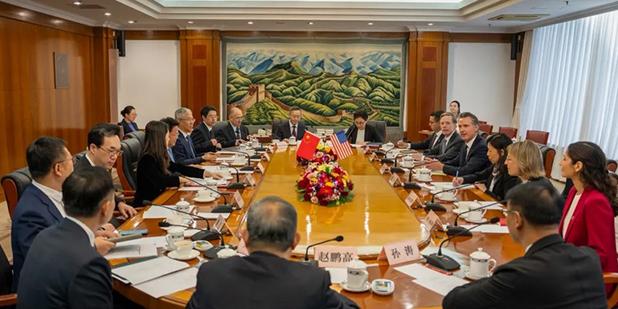Join us for a free one-day workshop for educators at the Japanese American National Museum, hosted by the USC U.S.-China Institute and the National Consortium for Teaching about Asia. This workshop will include a guided tour of the beloved exhibition Common Ground: The Heart of Community, slated to close permanently in January 2025. Following the tour, learn strategies for engaging students in the primary source artifacts, images, and documents found in JANM’s vast collection and discover classroom-ready resources to support teaching and learning about the Japanese American experience.
Memorandum of China and California, Understanding on Enhancing Cooperation on Strengthening Low-Carbon Development and a Green Transition, Oct. 25, 2023

The National Development and Reform Commission of the People's Republic of China ("NDRC") and the Government of the State of California of the United States of America ("California", and hereinafter referred to collectively as "the Parties'');
ACKNOWLEDGING that NDRC and California have signed the Memorandum of Understanding to Enhance Cooperation on Low Carbon Development Between the National Development and Reform Commission of the People's Republic of China And the State of California of the United States of America on September 15, 2015, and successfully cooperated on expanding economic growth while addressing air pollution, climate change, and environmental protection;
WHEREAS the Parties are committed to enhancing actions and policies to further strengthen and coordinate efforts to combat climate change and protect the environment;
Therefore, the Parties have reached the following understanding:
SECTION I
Objective
The purpose of this Memorandum of Understanding(MOU) is to establish a flexible framework between the Parties in order to continue collaborating to protect the environment, combat climate change and advance clean energy development.
In doing so, the Parties share the following common objectives:
1. To combat climate change, and advance medium- and long-term low-carbon development and the vision of carbon neutrality;
2. To advance the research, development and innovation of clean energy;
3. To promote the protection of the natural and built environment, and reduce air pollution and control carbon emissions; and
4. To support California and relevant localities in China to carry out policy communication on low-carbon and sustainable development at the provincial/state and city levels, share and communicate concepts, policies and practices related to the sustainable development of low-carbon cities, and enhance information exchange and practical cooperation.
SECTION II
Areas of Cooperation
On the basis of the principles of equality and mutual benefit, the Parties intend to cooperate through initiatives focused particularly on, but not limited to, the following areas of cooperation:
1. Activities to mitigate carbon emissions while enabling sustained economic growth;
2. Activities to decarbonize the power sector through the transition from fossil fuel energy to renewable energy;
3. Activities that exchange views on mid-term economic and energy planning documents;
4. Activities that promote efficient energy consumption among industrial, commercial, and residential sectors;
5. Activities that increase the usage of electrified transportation, such as supporting the adoption of New Energy Vehicles, Zero Emission Vehicles, and their associated charging infrastructure
6. Activities that support California and relevant localities in China to strengthen cooperation on clean energy and low-carbon development at the provincial/state and city levels, and promote pilot projects;
7. Activities to accelerate the deployment of offshore wind technology, including information and lessons learned on offshore wind installation, ports development, workforce development and supply chain development to support offshore wind;
8. Activities to accelerate the transition to clean energy technologies, including information exchange on energy storage, hydrogen, grid reliability strategies, and grid management technologies such as demand response and demand flexibility;
9. Activities to build climate resilient economies; and
10. Other mutually agreed activities.
Click on the link below for a pdf of the full MOU. The 2013 MOU is available here.
Featured Articles
Please join us for the Grad Mixer! Hosted by USC Annenberg Office of International Affairs, Enjoy food, drink and conversation with fellow students across USC Annenberg. Graduate students from any field are welcome to join, so it is a great opportunity to meet fellow students with IR/foreign policy-related research topics and interests.
RSVP link: https://forms.gle/1zer188RE9dCS6Ho6
Events
Hosted by USC Annenberg Office of International Affairs, enjoy food, drink and conversation with fellow international students.
Join us for an in-person conversation on Thursday, November 7th at 4pm with author David M. Lampton as he discusses his new book, Living U.S.-China Relations: From Cold War to Cold War. The book examines the history of U.S.-China relations across eight U.S. presidential administrations.




